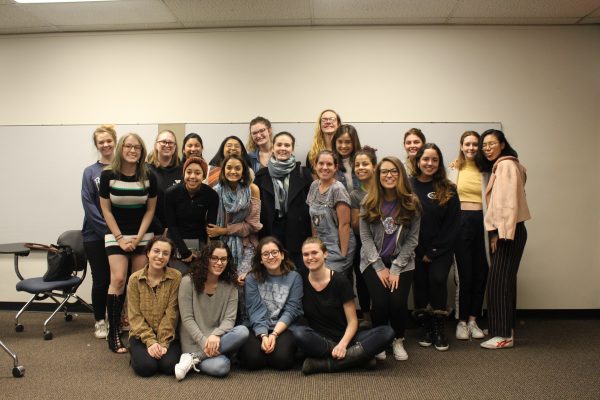“The Monologues:” A Space for All Vaginas, Any Vaginas, and Not Just Vaginas
February 15, 2018
Eve Ensler’s “The Vagina Monologues” is a play composed of various monologues revolving around themes ranging from menstruation to new sexual experiences. It has long been acclaimed for its ability to call attention to feminist themes. However, since its inception in 1996, many have shed light on its limiting and exclusionary nature. This year, Fordham students are playing an active role in reshaping the production in order to craft a space for all voices, not only those belonging to white cisgendered women.
“The Vagina Monologues” has been critiqued for its exclusion of people of color, transgender and non-gender conforming people. The name itself, implies that only those with vaginas should be able to tell their stories. Fordham’s production, subsequently, is shifting to calling the production “The Monologues.” Additionally, materials about the production place an asterisk next to the word vagina, and expand upon the formal title but specifying the inclusion of “any vaginas, all vaginas, and not just vaginas.”
“The Vagina Monologues” has been annually amended through the regular addition of new monologues. These newer pieces have shed light on women facing oppression outside of the United States, as well as trans issues. Furthermore, adaptations nationwide have sought to diversify their casts, in order to make space for the countless different narratives that need to be told.
This push towards inclusion has been widely echoed in recent years, but the Office for Student Involvement has refused to embrace it through a consistent lack of affiliation with “The Monologues,” as well as their insistence on not providing any funding for the production. As a result of this, the production is student-run, with the monetary support of the Women, Gender and Sexuality Studies Department. Karina Hogan, the co-director of the department, says the “program supports the Vagina Monologues each year because of the important role this production plays in raising awareness of sexual assault and harassment and in raising funds for organizations that work on victim assistance and assault prevention. This year, we are especially happy to see an increased number of student-written monologues and a more gender-inclusive approach than in past years.”
This year, “The Monologues” is being directed by Eliza Putnam, Fordham College at Lincoln Center (FCLC) ’18, who began her journey with the play as a freshman under the direction of Chris Hennessy, FCLC ’15. “I think I was really lucky that my first experience with ‘The Monologues’ was an experience in which the original text was already being challenged, and questions were already being asked about whose stories were being told and who was telling those stories,” Putnam said. As a result of her experience in past productions, Putnam is determined to increase inclusivity and give life to a production that does not censor the experiences of the wide array of identities being portrayed.
A two-week period in which performers will participate in creative writing workshops will follow the audition process. During this time, the performers will contemplate their personal experiences and have the opportunity to create monologues unique to their identities. Maya Rama Tatikola, FCLC ’20, who is producing this year’s production, was one of the students that wrote and performed a personal monologue last year. Tatikola expressed fascination about the possibility of another Fordham student performing her original piece in this year’s production, especially about the notion of someone reinterpreting something which she has written.
Performers for the play have been cast, and the show is currently in rehearsal; it will take place from April 13-15 in Franny’s Space. “The Monologues” invites audiences to celebrate the myriad identities that exist in the Fordham community who are not always given the recognition and support that they deserve.













